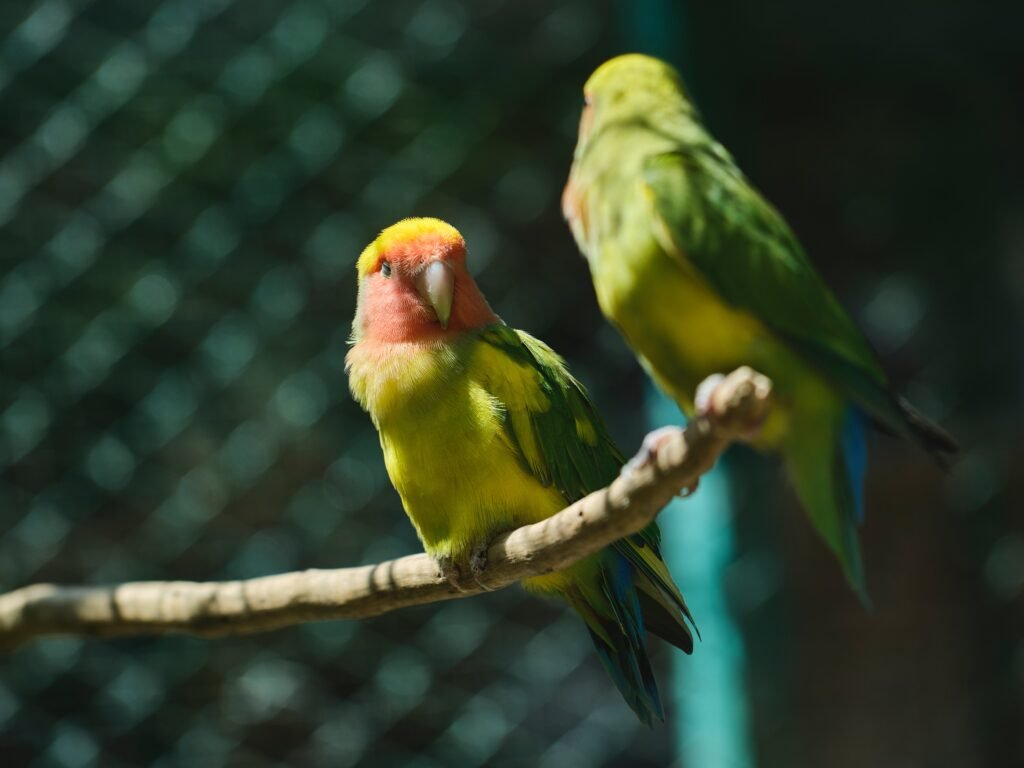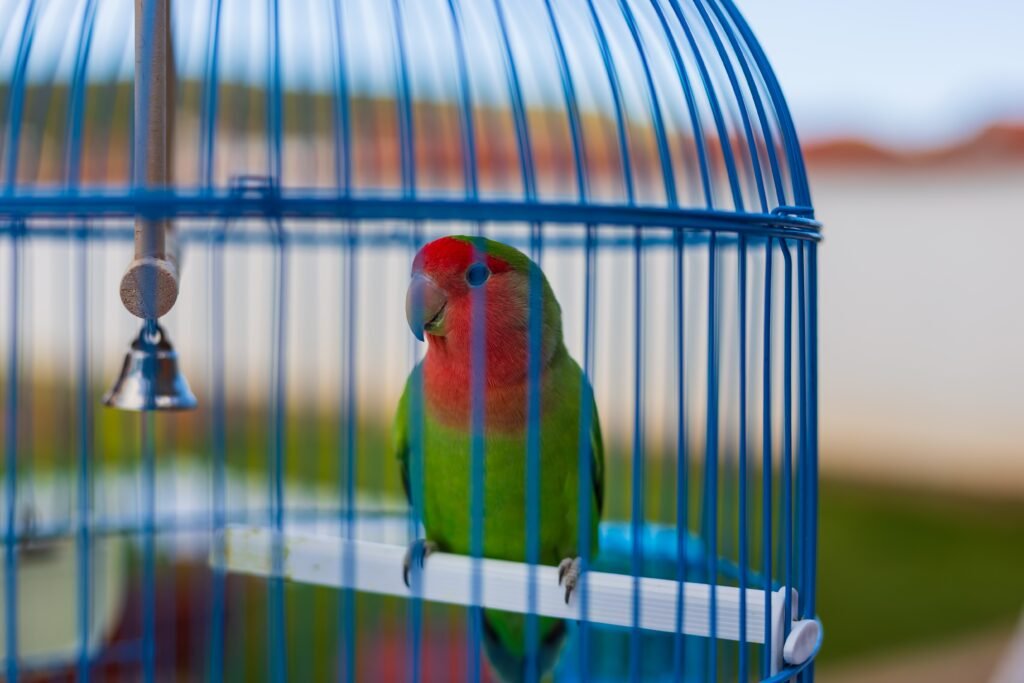Lovebirds are fascinating and beautiful creatures that make wonderful pets. These small parrots are known for their affectionate behavior, stunning plumage, and unique personalities. To ensure that your lovebirds are happy and healthy, providing them with proper care and attention is crucial. In this article, we will explore various aspects of lovebird care, from their dietary needs to their housing requirements, and offer practical advice for creating a nurturing environment for your beloved pets.
Understanding Lovebirds
Lovebirds belong to the genus Agapornis, and several species are commonly kept as pets, including the Fischer’s lovebird, Peach-faced lovebird, and Masked lovebird. These birds are highly social and thrive on companionship. Keeping lovebirds in pairs or small groups is recommended, as they tend to form strong bonds with their mates or flock members.
Lovebirds are known for their playful and affectionate nature. They enjoy interacting with their owners and can be trained to perform various tricks. Spending quality time with your lovebirds daily is essential for their emotional well-being. They love the bond they form with their owners and thrive on human interaction.
Housing and Environment
Creating a suitable habitat for your lovebirds is essential for their overall well-being. Here are some key considerations for their housing:
- Cage Size: Lovebirds need a spacious cage to move around freely. A minimum size of 24x18x24 inches is recommended for a single pair of lovebirds. Providing ample space ensures that they have enough room to exercise and play.
- Bar Spacing: When choosing a cage, ensure the bars are appropriately spaced to prevent your lovebirds from getting their heads or bodies trapped. This will ensure their safety and prevent any potential injuries.
- Perches: Lovebirds need various perches of different diameters and textures in their cage. Natural wood branches or rope perches are great options as they provide a comfortable grip and help exercise their feet. Having different perches also prevents pressure sores by distributing their weight evenly.
- Toys and Enrichment: Lovebirds are intelligent birds that require mental stimulation. Offer a variety of toys, such as swings, bells, and puzzle toys, to keep them mentally engaged and entertained. Toys also help prevent boredom and destructive behaviors.
- Location: The placement of the cage is important for your lovebirds’ well-being. Choose a well-lit area away from direct sunlight, air conditioning vents, or other sources of extreme temperature changes. Avoid drafty areas, as lovebirds are sensitive to temperature fluctuations.
- Temperature and Humidity: Lovebirds thrive in a comfortable temperature range of 65-80°F (18-27°C). Ensure that the room temperature does not drop below or exceed this range. Additionally, maintain a moderate humidity level between 40% and 60% to prevent dryness or excessive moisture in the air.
Diet and Nutrition
A balanced and nutritious diet is crucial for your lovebirds’ overall health and vitality. Here are some guidelines to follow:
- Fresh Water: Provide clean, fresh water daily in a sipper bottle or a shallow dish. Change the water regularly to ensure hygiene and prevent bacterial growth.
- Pelleted Diet: Lovebirds should be fed high-quality pelleted bird food specifically formulated for their nutritional needs. These pellets provide essential nutrients and help prevent selective eating habits. Introduce the pellets gradually, mixing them with their diet until they fully transition.
- Fresh Fruits and Vegetables: Incorporate a variety of fresh fruits and vegetables into your lovebirds’ diet. Apples, grapes, carrots, and leafy greens are excellent choices. Wash the produce thoroughly and remove any seeds or pits that can be harmful. Rotate the fruits and vegetables to provide a diverse range of nutrients.
- Seeds and Nuts: While lovebirds enjoy seeds and nuts, these should be given in moderation as treats due to their high fat content. Excessive consumption can lead to obesity and other health issues. Offer a small amount as an occasional reward or for training purposes.
- Calcium and Grit: Lovebirds need a source of calcium for strong bones and proper eggshell formation (in breeding females). Provide a cuttlebone or mineral block in their cage. Avoid offering grit as it is not necessary for their digestion and may cause health problems if ingested in large quantities.
Exercise and Mental Stimulation
Keeping your lovebirds physically active and mentally stimulated is essential for their well-being. Here’s how you can achieve this:
- Flight Time: Lovebirds are natural flyers and need regular exercise to maintain muscle tone. Allow supervised flight time outside the cage in a safe and secure area. Ensure no open windows or doors could lead to accidental escapes. Supervision is crucial to prevent accidents or injuries.
- Social Interaction: Lovebirds are highly social birds that crave companionship. Spend quality time with your lovebirds daily, talking to them, teaching them tricks, or observing their behavior. They enjoy their bond with their owners and thrive on human interaction.
- Puzzle Toys and Foraging: Lovebirds are intelligent and curious birds. Introduce puzzle toys and foraging activities to keep them mentally stimulated. Hide treats inside toys or provide natural materials, such as coconut shells or seagrass mats, for them to explore and play with. This engages their natural foraging instincts and prevents boredom.
- Environmental Enrichment: Lovebirds appreciate a stimulating environment. Provide branches, safe chewing materials, and natural perches to mimic their natural habitat. This allows them to engage in natural behaviors like climbing, chewing, and exploring.
Healthcare and Veterinary Care
Maintaining the health of your lovebirds requires regular veterinary check-ups and preventive care. Here are some important aspects to consider:
- Find an Avian Veterinarian: Locate a reputable avian veterinarian specializing in bird care. Regular check-ups help detect potential health issues early on and ensure your lovebirds receive appropriate treatment. Avian veterinarians have the expertise to provide tailored care for your lovebirds’ needs.
- Wing Clipping: Consult your avian veterinarian about wing clipping, which can prevent accidental escapes and potential injuries. Proper guidance is essential to ensure the wings are clipped safely and without causing discomfort. Wing clipping can be done during a veterinary visit or under the supervision of an experienced professional.
- Nail and Beak Trimming: To prevent overgrowth, lovebirds’ nails and beaks may require occasional trimming. Seek professional guidance from your avian veterinarian to ensure proper technique and avoid causing any harm to your birds. Regular trimming helps maintain their overall health and prevents injuries.
- Observing Behavioral Changes: Monitoring your lovebirds for any signs of illness or behavioral changes is important. Lovebirds are masters at hiding signs of illness, so it is crucial to be vigilant. Symptoms such as changes in appetite, feather plucking, or excessive lethargy may indicate underlying health issues that require immediate veterinary attention. Contact your avian veterinarian if you notice any unusual behavior or signs of distress.
In conclusion, providing optimal care and attention to your lovebirds is crucial for their well-being and happiness. You can ensure a long and joyful companionship with these delightful avian pets by creating a suitable habitat, offering a balanced diet, providing mental stimulation, and ensuring regular veterinary care. Remember, lovebirds thrive on love and care, so shower them with affection to create a strong and lasting bond.
Lovebirds Care Tips: FAQ
- Q: What is the recommended cage size for lovebirds?
- A: A minimum size of 24x18x24 inches is recommended for a single pair of lovebirds to provide ample space for exercise and play.
- Q: What should I feed my lovebirds?
- A: Lovebirds should be fed a balanced diet consisting of fresh water, high-quality pelleted bird food, fresh fruits and vegetables, and seeds and nuts in moderation.
- Q: How can I keep my lovebirds mentally stimulated?
- A: You can keep your lovebirds mentally stimulated by providing flight time outside the cage, social interaction, puzzle toys and foraging activities, and an enriching environment with branches and natural perches.
- Q: What should I do if my lovebirds show signs of illness or behavioral changes?
- A: If your lovebirds show signs of illness or behavioral changes such as changes in appetite, feather plucking, or excessive lethargy, contact a reputable avian veterinarian for immediate attention. They can provide the necessary care and treatment for your birds.
.


